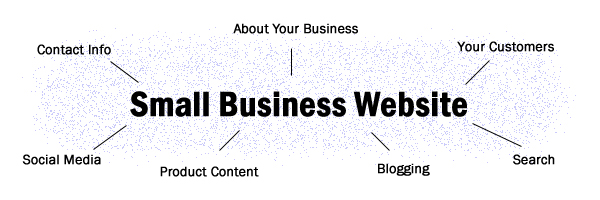Why Your Small Business Needs a Website – Strong Internet Presence
In today’s economy, there are many answers as to why your small business needs a website. It goes beyond just advertising, a website isn’t just a digital billboard in the cloud. Having a website can shrink the level of competition between a small business with few employees and those mid range size companies. Unfortunately, owners must overcome a few barriers to get a small business website. These usually are a lack of time or lack of know how.
Every small business is going to have a goal in common – to get more customers. Today we will cover four reasons why your small business needs a website.
Central Information about Your Product
Your small business will have blogs, general content, online reviews and many more tools all centered around your website. This gives potential customers everything they need in a one stop shop.

- General Content – Visitors can learn about your products and what solutions are offered
- Portfolio & Reviews – Potential customers can see your prior work and feel confident by reading previous customers’ experiences
- Product Knowledge – You can show off your expertise on a subject on your blog or by posting short videos. This will further gain your customers’ trust about your product.
- Communication – You can provide various ways for future customers to get in contact with your business. There can be contact info listed with your operational hours, a map to your business and online forms for customers to send messages to you directly.
- Social Media – Put your customers to work by having them share your great product for you. Social Media is a great way to get the virtual word of mouth going. Using Facebook, Twitter, Google+ and all your social media accounts to drive future customers to your website
These pillars are the core of a small business website. Your product will be known, communicated and searchable. And the best part yet… is that a website is affordable and very cost effective.
Get More Customers
A customer want to do business with people they can trust. How many times have you gone to amazon to buy a DVD player and sorted by most positive reviews? Businesses should already be monitoring product reviews that customers leave on their website or 3rd party websites like Yelp. But many small businesses stop there. Blogs, for example, are a way to grew trust with your customer base. Blogging shows off your product knowledge. Combining that with easy ways to contact you will generate opportunities and leads. Your contact list will grow for use in newsletter and email campaigns. Remember, one of our goals is to get more customers.
The technical side will also provide information about your customers. There are various internet analytic tools out there, such as Google Analytics. A customers interest in your products and services can be shown by the number of page views reported in the analytics tool on a specific page. On the other hand, Google Analytics can also show you which specific pages are lacking visits or even being where customers exit your website.
Expanding Your Services Online
Once your business is online, your business is open 24 hours a day. People that were never exposed to your business due to location, time or any other barrier can now find you online. The goal is to get more customers by expanding the audience. Businesses that have been operating locally will expand their customer base to a larger area. More possible customers will lead to expanding your business.
Customers can come to your website at any hour, read information about your products and services, engage in communication if need be, and finally get that order on the books. This is an affordable investment with little to no increase in staff and high ROI.
Unique or niche markets benefit greatly from creating a website as they usually have low competition, so their benefits are multiplied.
Credibility
15 years ago, marketing a small business took a very different approach. Today, adding a website to a small business shows your small business has certain validity, establishment and the long term feel to it. Established businesses aren’t looking to take your money and run. A business webpage shows stability within the company and organization to maintain the page.
A website for a small business shows that communicating to its customers is a priority. Being open to questions and feedback shows that the business has more interest that just getting the sale. These are all factors that build trust between the business and its customers, no matter if there is thousands of employees or a small handful. This is why your small business needs a website.
Austin Webpages is a small Austin based company ready to take your small business online to maximize its marketing potential. Find a website you like the look and feel of, and contact us today!
 Forget Panda, Penguin and other code named updates to Google’s algorithm. Instead lets look at the main ideas behind all of Google’s updates. In the early 2000’s, Google changed the game and stopped responding to keyword stuffing. An example of keyword stuffing is if “Google changed their algorithm” or some variation of that phrase, were repeated into every other line of this blog.
Forget Panda, Penguin and other code named updates to Google’s algorithm. Instead lets look at the main ideas behind all of Google’s updates. In the early 2000’s, Google changed the game and stopped responding to keyword stuffing. An example of keyword stuffing is if “Google changed their algorithm” or some variation of that phrase, were repeated into every other line of this blog.